An Interview with Ecology Center Executive Director Martin Bourque on the United Nations Plastic Treaty meetings in Nairobi, Kenya, November 13–19, 2023
This past November, Ecology Center Executive Director Martin Bourque returned from the United Nations Environmental Programme Plastic Treaty meetings in Nairobi, Kenya with the latest news in the global fight to end plastic pollution.
The UN Plastic Treaty aims to be the first-ever international, legally binding treaty on plastic pollution. November’s meetings in Nairobi, Kenya, mark the third in a series of five multinational sessions. The next and fourth session is planned for April 2024 in Ottawa, Canada. Like most groundbreaking efforts, everything on the topic of plastic pollution has been up for negotiation including where to begin.
⤘⤘⤘
Who were some of the influencers in these negotiations?
Martin:
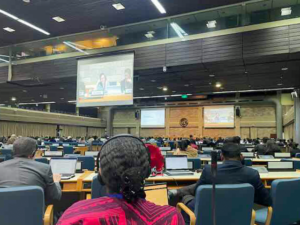 Roughly 170 nations attended the Intergovernmental Negotiating Committee meetings (INC-3). Of course, the world’s largest oil producing countries—like Saudi Arabia, Russia, and Iran—and companies were in full attendance. The so-called ‘Like-Minded Nations’ group represents major oil-producing nations and basically worked to stall or derail the negotiations.
Roughly 170 nations attended the Intergovernmental Negotiating Committee meetings (INC-3). Of course, the world’s largest oil producing countries—like Saudi Arabia, Russia, and Iran—and companies were in full attendance. The so-called ‘Like-Minded Nations’ group represents major oil-producing nations and basically worked to stall or derail the negotiations.
Funny story—it turns out that a lot of these major oil-producing countries were not paying close attention in the March 2022 meetings in which the United Nations Environment Assembly (UNEA) initially committed to this ambitious goal. This ambitious two-year goal to create a plastic treaty that includes the marine environment and addresses the full lifecycle of plastics was pushed through by the global south and island nations that are disproportionately impacted by plastics pollution.
There were also intergovernmental groups like the High Ambition Coalition to End Plastic Pollution, which represents 64 nations, from Finland to New Zealand, including notably the African and small island nations that are highly impacted by plastic pollution. https://hactoendplasticpollution.org/
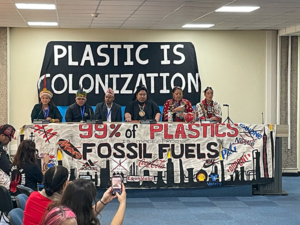 Well-organized coalitions were present. A global coalition of waste pickers was well represented; as were tribal and indigenous groups. These groups are transnational, very well organized, and can represent millions of people. For example, indigenous representatives from New Zealand, North America, South America, and Nepal held a press event at INC-3 and led with a campaign message of “plastic is colonization” and called out the major brands that are affecting people across the globe.
Well-organized coalitions were present. A global coalition of waste pickers was well represented; as were tribal and indigenous groups. These groups are transnational, very well organized, and can represent millions of people. For example, indigenous representatives from New Zealand, North America, South America, and Nepal held a press event at INC-3 and led with a campaign message of “plastic is colonization” and called out the major brands that are affecting people across the globe.
Non-governmental organizations, some that we partner with, like Break Free From Plastic and the Global Alliance for Incinerator Alternatives (GAIA), also had delegations at the meetings. These organizations are also transnational, very well organized and represent millions of people.
What are some of the major issues on plastic pollution that emerged at this stage in the discussions?
Martin:
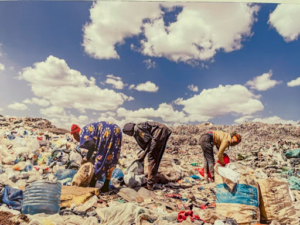 There was fundamental discussion about voting versus a consensus approach to decision-making. While generally, a consensus approach is preferred, in this context, that would mean any country could derail the process. A voting option would ensure that a simple majority who supports an aggressive climate treaty would have a more efficient way to move forward quickly and avoid vetoes used to delay the process.
There was fundamental discussion about voting versus a consensus approach to decision-making. While generally, a consensus approach is preferred, in this context, that would mean any country could derail the process. A voting option would ensure that a simple majority who supports an aggressive climate treaty would have a more efficient way to move forward quickly and avoid vetoes used to delay the process.
The definition for the full life cycle of plastics was a central topic. Saudi Arabia, for example, was basically saying that the life cycle of plastics begins with disposal. The original intent of the mandate was that the full lifecycle of plastic starts at the wellhead. So, there is a lot of work to be done to reconcile this difference.
Another topic was which elements of the treaty would be mandatory and which would be voluntary. Without binding mandatory reduction goals, there is no way the intent of the mandate can be met.
Extended Producer Responsibility, or EPR, was discussed and is a critical issue in determining which parts of the implementation of the treaty will be paid for by the brands that produce and sell polluting plastic packaging.
Financial mechanisms for developed nations to help developing nations cover the costs of managing plastic pollution and cleaning up existing legacy plastic was also a key topic. There is some recognition that wealthy producer nations will need to pay for some of this, but how, and how much, are still very much in debate.
What are some of your takeaways from the meetings?
Martin:
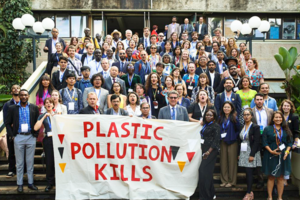 These discussions have the ability to accelerate global discussions. However once a treaty is created, each country has to go back to their government and try to ratify the treaty. In the past, the United States Congress has not adopted UN treaties like the Basel Convention. The US delegation has generally supported the petrochemical companies and sought to weaken these treaties, knowing the US would never become parties to the accords. Even when President Obama joined the Paris Climate Agreement by executive order, President Trump later pulled out.
These discussions have the ability to accelerate global discussions. However once a treaty is created, each country has to go back to their government and try to ratify the treaty. In the past, the United States Congress has not adopted UN treaties like the Basel Convention. The US delegation has generally supported the petrochemical companies and sought to weaken these treaties, knowing the US would never become parties to the accords. Even when President Obama joined the Paris Climate Agreement by executive order, President Trump later pulled out.
We probably won’t see any on the ground impacts from this treaty until later this decade, In the meantime, the policies of individual actors like the EU and Chinese governments or big brands like Coke, Procter and Gamble, or retailers like Amazon, Walmart and Target can have an immediate and dramatic impact on plastic pollution.
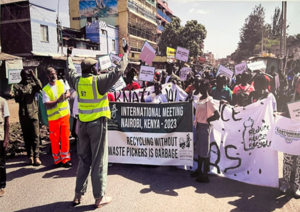 It would be a welcome turn of events to see major brands exercise their ability to tap down the use of single use plastic packaging. In the US, they are turning more and more in this direction to meet the demands of their customers. It’s an example of one of the Ecology Center’s guiding principles—think global, act local. The sum total of consumers who are turning away from plastic packaging really can have an impact on global plastic pollution.
It would be a welcome turn of events to see major brands exercise their ability to tap down the use of single use plastic packaging. In the US, they are turning more and more in this direction to meet the demands of their customers. It’s an example of one of the Ecology Center’s guiding principles—think global, act local. The sum total of consumers who are turning away from plastic packaging really can have an impact on global plastic pollution.
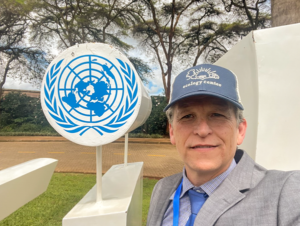 When I reflect on the spread of Berkeley’s Single Use Disposable Foodware Ordinance and California’s new EPR for plastic packaging law, I see how the discourse is moving faster and faster and having an ever greater impact.11 Cities have now adopted versions of our ordinance, and Oakland and San Francisco are working on them currently. Elements of this ordinance are on the table in the Plastic Treaty. EPR is a central tool being considered in the treaty, and hopefully, California’s law will set the standard. Together, these efforts add up to become major influencers in the global plastic pollution conversation.
When I reflect on the spread of Berkeley’s Single Use Disposable Foodware Ordinance and California’s new EPR for plastic packaging law, I see how the discourse is moving faster and faster and having an ever greater impact.11 Cities have now adopted versions of our ordinance, and Oakland and San Francisco are working on them currently. Elements of this ordinance are on the table in the Plastic Treaty. EPR is a central tool being considered in the treaty, and hopefully, California’s law will set the standard. Together, these efforts add up to become major influencers in the global plastic pollution conversation.
⤘⤘⤘
With negotiations at the mid-way point of a very aggressive timeline, the Secretariat is working on creating a revised draft of the plastic pollution treaty, referred to as the “revised zero draft,” that will be available in English by December 31, 2023 and serve as the basis of the negotiations in Ottawa, Canada come April 2024.

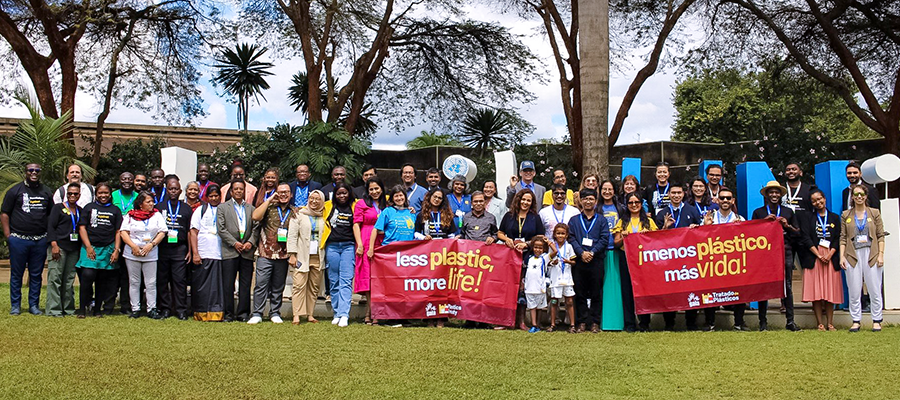



So glad I read this and THANK YOU for writing it for us!
Pingback: Environmental Justice Coalition at Global Plastics Treaty - Just Transition Alliance